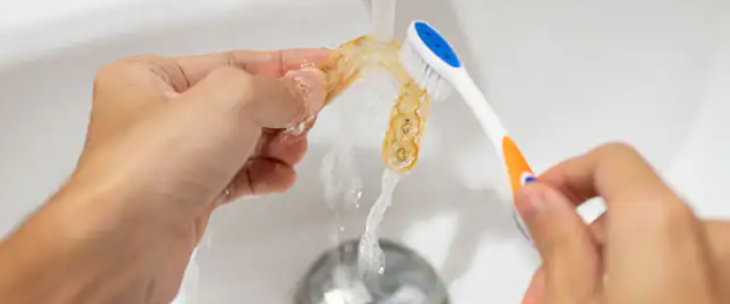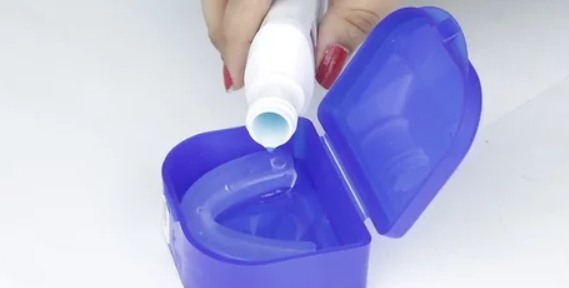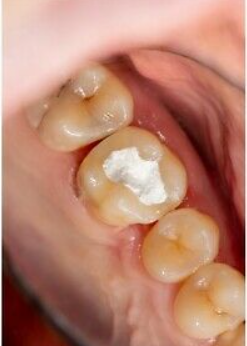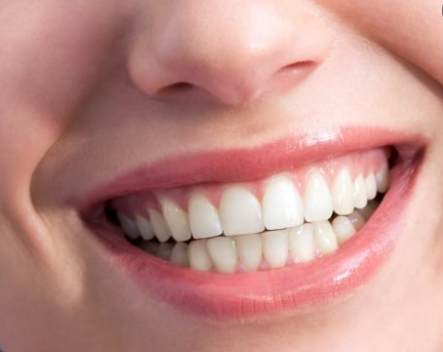Mouthguards are devices that are worn to protect your teeth from teeth grinding or clenching when sleeping or while participating in sports (sports mouth guards). They can also aid with snoring and sleep apnea.
So you’ve acquired a night guard but don’t know how to keep it clean. No worries, just follow the easy procedures below, and you’ll have a gleaming bite guard ready to use again in no time.
Simple Instructions for cleaning a mouth guard
- As soon as you take the mouth guard out of your mouth, rinse it with warm water.
- Using a soft or medium toothbrush, gently brush the dental device.
- Allow time for it to dry. Allow your bite guard to dry completely on a hard surface.
- Keep your device dry by storing it in a case.

Now, let’s go over the preceding steps in more detail.
Using warm water to rinse your mouth guard will help remove bigger food debris and loosen some plaque. It’s important to rinse it as soon as you remove it to prevent bacteria from forming. On the surface of the mouthguard, food particles can also begin to smell and decay. You do not want this, believe me!
Brushing the mouthguard will assist in removing the remaining debris and plaque. You can either use your existing toothbrush or invest in a new one. It’s entirely up to you. To avoid damaging the dental guard, we recommend brushing with a soft or medium bristle brush.
NOTE: Using toothpaste on the brush is not recommended. The majority of pastes contain abrasive components that can cause your mouthguard to wear out faster. They may even create further scratching and, as a result, limit the life of the product.
It’s critical to dry your mouthguard before putting it away to avoid germs buildup. We usually recommend leaving the guard for 15-20 minutes on a flat, dry surface. We also warn against putting the night guard on a napkin or any other type of paper that may have dirt or bacteria on it.
In this case, a clean plate or plastic container might be used for the drying process.

Why store your mouthguard in a case?
To avoid damp or bacterial build-ups, isolation is essential. It’s never a smart idea to leave your night guard on top of your bathroom shelf. Bathrooms are moist and humid all of the time, which might cause your guard to warp quickly.
Keep your guard in its designated container (every one comes with one) in your bedroom or living room instead. Whichever one you believe to be the least humid.
Deep Clean Your Mouth Guard Once a Week
Every day, clean your dental guard according to the directions above. If you want to follow our best practices, then, extensive cleaning should be done once a week.
There are three quick and easy ways to accomplish this in order to maintain proper oral hygiene.
Use a denture cleanser that is available over the counter. Look for tablets or ready-to-use combinations that dissolve in water at your local pharmacy. Fill a glass half full of warm water, dissolve the tablet, and soak your night guard for around 20 minutes. On the back of most denture cleanser packages, there are simple directions to follow. It’s crucial not to soak the guard for any longer than the manufacturer recommends.
Combine white vinegar and hydrogen peroxide in a spray bottle. Fill a standard glass halfway with distilled vinegar. Allow up to 30 minutes for the mouth guard to soak. Make sure you don’t go over the time restriction.
Remove the night guard and rinse it with water after soaking. Make the same adjustments to the glass or bowl you used. Fill the same bottle halfway with hydrogen peroxide and soak the guard for an additional 30 minutes. Remove the guard after the timer has expired and wash it in warm water.
This approach takes a little longer, but it removes all bacteria and plaque from your dental device. Use mouthwash and water. When it comes to deep cleaning your dental guard, this is the final frontier.
Combine 30-40ml of any quality mouthwash with a cup of water. You should end up with a mixture of 250-300ml. Soak the night guard in the mouthwash and keep it there for 30 minutes once it has been totally diluted.
Rinse the device after removing it from the mixture and dry it on a flat, clean surface.
NOTE: Do not soak your night guard for more than one hour in any kind of combination. Mouth guards are only supposed to be in contact with saliva and water for extended periods of time. Other liquids, particularly chemical liquids, can damage the device.
Keep a Clean Case
Manufacturers of mouth guards offer casings that are specifically made for their products. These cases aren’t simply a nice method to present the product; they’re also a crucial tool for keeping your tooth guard in good shape.
Never forget about your case! It’s just as vital to keep your designated mouthguard storage clean as it is to keep your mouthguard clean. When it comes to places and locations, bacteria makes no distinction. If you don’t take preventative precautions, it will build up anywhere, at any moment.
Every few days, wash the case with water and dishwashing soap. Make sure you rinse it thoroughly before putting it in your mouth, so it doesn’t taste like detergent.
The majority of plastic cases are good for about 8 months. They begin to wear out beyond that time span. Most mouth guards, on the other hand, would have served their purpose by that time.

Check It, Before You Wreck-It
Make it a habit to inspect your night guard for damage at least once a week. Excessive clenching and grinding of the teeth will eventually wear out the guard, no matter how tough it is. In any event, the bite guard is preferable to your teeth and jaw muscles!
If you buy an over-the-counter dental guard, make sure to have it checked by your dentist. Your dentist should be able to verify if the guard fits well in your mouth, in addition to providing extra professional advice.
NOTE: When it comes to your oral health, don’t be stingy. Simply replace the mouthguard if it is damaged. Allowing your jaw to suffer the effects is not worth it.



